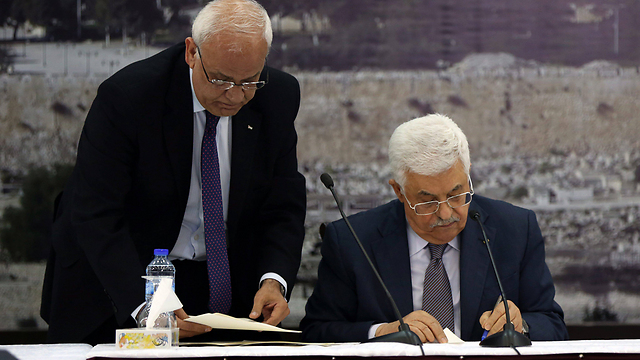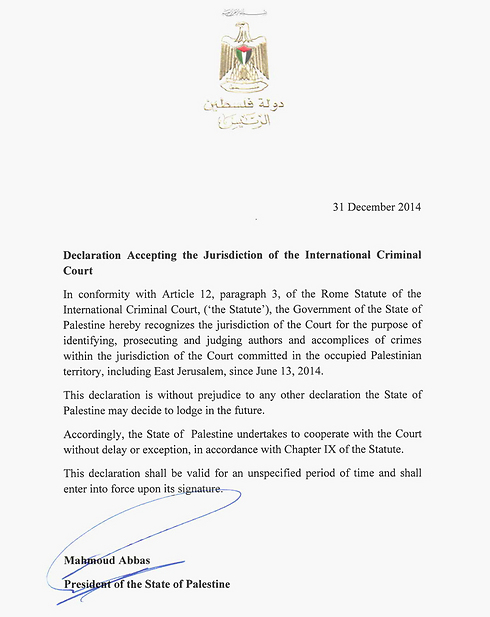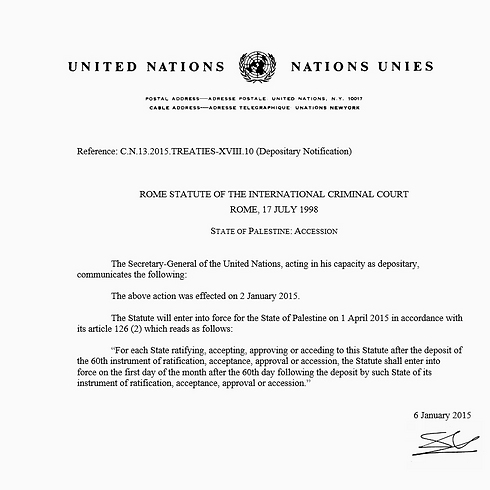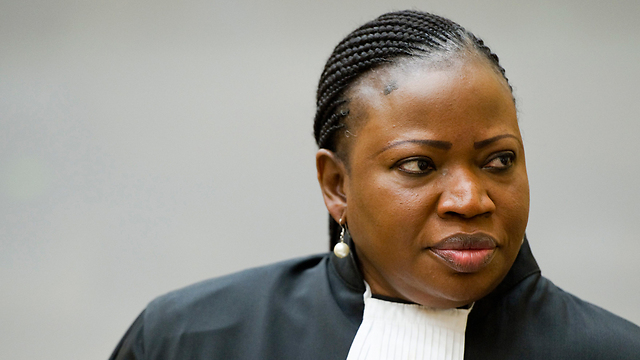
Does Abbas really want to take Israel to The Hague over Gaza?
The Palestinian Authority has slim chance of an ICC investigation of Israel, and could even face its own probe, says international legal expert Sigall Horovitz; meanwhile, Israel should consider its own steps to avoid seeing its troops and leaders in the dock.
The Palestinian Authority might be threatening to "go all out" against Israel in the international arena, but in reality is taking steps that apparently contradict such claims.
An in-depth look by Ynet at the latest Palestinian maneuvers and their significance in terms of international law reveals that the Palestinians' enrollment in the International Criminal Court at The Hague will probably not pave the way for an investigation into IDF soldiers and officers or Israeli leaders at The Hague, for crimes allegedly committed during Operation Protective Edge in Gaza last summer.
In fact, it actually may deny the Palestinians the chance to request an investigation into the IDF's behavior during the Gaza conflict and other operations.
On January 2, 2015, the Palestinian Authority became party to the Rome Statute and therefore the International Criminal Court. Three days earlier, Abbas had submitted a request to join the Statute, in the hope that this would in turn put more pressure on Israel – and threatened to submit a petition to ICC accusing Israel of war crimes, genocide and crimes against humanity in the territories beyond the 1967 lines.
The Rome Statute only comes into effect for new members on the first of the month that follows 60 days after joining (article 11.2 of the convention). In the case of the Palestinian Authority, this means April 1, 2015.
In general, it is only after this target date that the ICC is authorized to investigate events in the jurisdiction of that state (article 126 of the Statute). By this calculation, the Statute will come into force with respect to the Palestinian Authority on April 1, and the ICC will only have jurisdiction to investigate the operations performed in its jurisdiction from that date onwards.
Twin tracks: The Palestinian gamble
But the Palestinians were not content with applying to join the ICC, taking another, parallel route. They presented a declaration to the ICC that they were giving the Court authority to act retroactively going back to June 13, 2014, in accordance with section 12.3 of the Rome Statute.
The Hague received the declaration on January 1, 2015 – a day before the Palestinian Authority became a party to the treaty. The Palestinians say they have high hopes for this move, as accepting their declaration will spark an investigation into events in the West Bank and the Gaza Strip since the beginning of Operation Brother's Keeper through to Protective Edge and beyond.
"Article 12.3 of the Rome Statute says that countries that are not members of the treaty can make an ad hoc application for the tribunal to investigate a particular event," says Dr. Sigall Horovitz, former legal advisor at the UN tribunals for Rwanda and Sierra Leone, and researcher at the University of Haifa and the Hebrew University.
As member states cannot give the court jurisdiction to investigate retroactively, this request must be accepted before April 1, when the PA becomes a full member.
According to Horovitz, the Palestinian Authority likely timed their declaration under section 12.3 to before their full membership took effect. During this period, the PA enjoys all the benefits of full membership, without giving up on the ability to grant retroactive authority to the court in relation to the two IDF operations in the summer.
"The Palestinians have taken a gamble," says Horovitz. "There is a good chance that the chief prosecutor at The Hague will reject the application under article 12.3 in light of the fact that the Palestinian Authority has recently become a member to the Rome Statute."
Poor precedents
This is in fact a major gamble for the Palestinians, given that the ICC prosecutors do not take a decision to launch an investigation overnight, and the research carried out by the prosecution before deciding whether or not to begin any investigation can take an extremely long time, perhaps months or even years.
According to the ICC website, the court is currently engaged in eight preliminary examinations - in Afghanistan, Colombia, Georgia, Guinea, Honduras, Iraq, Nigeria and Ukraine. In the case of Ukraine, for example, the Kiev government announced in April 2014 that it recognized the authority of the ICC to investigate war crimes allegedly committed by the government of ousted pro-Russian president Viktor Yanukovych. Eight months have passed since Ukraine turned to The Hague, and a formal investigation has not yet begun.
The case of Georgia also does not bode well for the Palestinians. On August 14, 2008, the ICC announced the start of a preliminary examination at the request of Georgia – a week after Russia began attacking Georgian forces in the breakaway province of South Ossetia. Seven years have passed since then, and an official investigation is still nowhere in sight.
It seems, therefore, that the Palestinians will not be able ask the ICC to investigate events before it joined the Statute, including the people behind IDF operations Cast Lead, Pillar of Defense, Brother's Keeper and Protective Edge.
If this is indeed the case, why did Abbas rush to take this step instead of waiting for the prosecutor's decision regarding the retroactive investigation?
“I think Abbas did do so because he cannot afford to wait several years for the ICC to deal with the issue of the settlements," Horovitz says. "The question is not why he joined the ICC but why he submitted the application under article 12.3.
"The answer is public relations, mainly for the Palestinian public and perhaps even to put pressure on Hamas. Also, note that they only went back retroactively to Protective Edge, which does not involve acts of the Palestinian Authority or Fatah (as opposed to the Intifadas). So if the article 12.3 application gets thrown out, they can claim they tried. If it gets accepted, only Hamas (and Israel) get caught. It's a win-win situation for Abbas”.
After its request for recognition of statehood by the UN Security Council was rejected in late 2014, the Palestinian Authority threatened to join The Hague and file claims against Israel for war crimes in the territories beyond the Green Line - hence its application to join the Rome Statute. But this is a double-edged sword for the Palestinians, for while joining the ICC could benefit them in some ways, it could also cause them significant damage.
"The Palestinians have far more reason than Israel to be afraid of the retroactive authority of the Court, because they fired rockets at Israel's civilian population," says Horovitz.
"They are now united (in the Hamas-Fatah government), so if a retroactive investigation is launched, then the Hamas component that fired rockets at Israel actually hurts the Palestinians. The Hamas component of the PA does have something to fear from an investigation, due to its explicitly declared support for firing missiles to hit civilians during Protective Edge and before."
Dirty hands
However, it could be the case, Horovitz suggests, that Abbas and the Palestinians do not care if they shoot themselves in the foot and spark an ICC investigation of them for war crimes too.
"Maybe they really want proceedings against Israel, even at the cost of damage to themselves," Horovitz speculates.
She points out that the Palestinian Authority's hands are far from clean, and it may be investigated for supporting acts of terrorism and financing prisoners who had engaged in terrorism.
"Hopefully, and more than likely, the international court will only have the authority to investigate events in the West Bank and Gaza Strip from when the Rome Statute applies to the Palestinian Authority - April 1, 2015.
"From that moment, the Palestinian Authority and Hamas will face a deterrent. True, they have tied their own hands, but they want to be a democracy and a serious country - they joined human rights conventions and the Convention on the Rights of the Child. They want to raise their prestige in the world, and Israel should welcome that. The Rome Statute is also charter of human rights, and Israel surely wants a democratic and peaceful state alongside it."
Ynet's Palestinian affairs correspondent Elior Levy believes that despite the Palestinian accession to The Hague and bombastic statements by Abbas and PA officials accusing Israel of war crimes, the PA is eagerly anticipating April 1. Once they become full members in the Rome Statute, they cannot – due to the terms of the convention – bring charges against Israel for events prior to this date.
While this may sound like a contradiction, what is important to Abbas is that he is perceived to have not caved in to pressure, that he did go to the UN Security Council and demand recognition of the state of Palestine, signed international treaties and joined the ICC.
To the average Palestinian this enough, and he has no reason to complain to his leaders, even if later it turns out that Israel is not subject to any investigation. The theatrics, in this case, are more important to Palestinian leaders than any substance - because they strengthen public support. In practice, they know that an ICC investigation into Protective Edge, for example, could harm them perhaps more than Israel.
Even if the Palestinian accession to the ICC does not result in a retroactive investigation, it could still cause a headache for Israel.
"The big problem is Israel's settlement project," says Horovitz. "Although the project was started in the past, it continues today and will do so for the foreseeable future. Israel claims that the settlements are not located in occupied territories and therefore transferring people to these areas is not considered a war crime. From Israel's perspective, the settlements do not violate Israeli law. On the contrary, they reflect government policy."
But a 2004 advisory opinion from the International Court of Justice (ICJ) on the legality of the West Bank separation fence did not agree.
"It notes that the settlements are in occupied territory and receive backing and encouragement from the State of Israel," says Horovitz. "The issuance of tax breaks, for example, means the state's encouragement makes settlement in the territories a war crime. The ICC is not bound by the decision of the ICJ, but it may rely on it."
In this case, Israel could take several steps to get the court in The Hague "off its back", such as prosecuting those responsible for the establishment of settlements. In such a situation, Horovitz says, "the defendants will be politicians rather than ordinary settlers because they are the ones that spearheaded this policy."
Israel could also dismantle the settlements and withdraw from the territories, Horovitz says, "so that the ICJ does not intervene."
In general, the Rome Statute defers to a nation's own judicial system. "Where there is a suspected crime that falls under the Rome Statute (war crimes, crimes against humanity and genocide), the court at The Hague will not intervene if the country is actively investigating," Horovitz points out. "The IDF and Israel carry multiple investigations, thereby avoiding The Hague."
Israel's options
What else could Israel do to ensure it does not end up the subject of an investigation at The Hague?
"Israel could ratify the Rome Statute (it has only signed it, and ratification is required to become a full member - RS) and make use of article 124," suggests Horovitz. According to the Statute itself, article 124 "allows States to choose not to have their nationals subject to the Court’s jurisdiction over war crimes for a seven year period after ratification." This would give Israel a seven-year breather, which according to Horovitz would enable it to take certain steps to keep its politicians and soldiers out of the dock at The Hague.
"Israel could dismantle and outlaw the settlements. It could also reach a land-swap arrangement with the Palestinian Authority. For example, Ma'ale Adumim – which will be part of Israel under any agreement – would not be considered occupied territory and therefore settlement there would be legal under international law," says Horovitz, outlining Israel's options.
"In essence, serious peace negotiations could lead to the suspension of an investigation at The Hague. The Security Council can request a freeze on an investigation process for the sake of world peace."
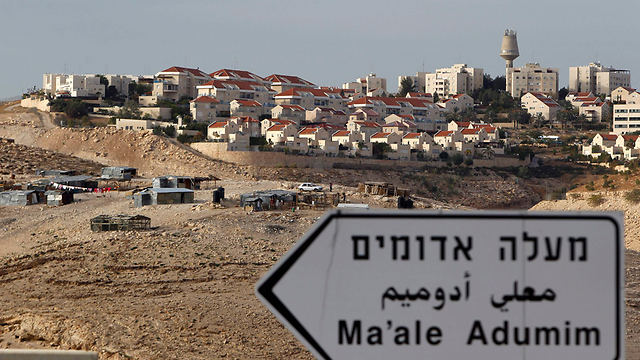
During any negotiations between Israel and the Palestinians, Horovitz says, Israel could ask the prosecutor at The Hague not to open an investigation against it on the grounds that the negotiations could lead to peace, and peace would be accompanied by a political agreement that would resolve the problem of the occupied territories.
In practice, however, while Israel is preparing for the March 17 general election and it is unclear whether a left-wing or right-wing government will come after, the peace process has never looked further away, after its collapse in 2014 following frantic mediation efforts by Secretary of State John Kerry.
"From a rational-legal perspective, Israel should seriously think about the option of ratifying the Rome Statute and using the seven-year period in which there would not be an investigation against it. But some Israeli leaders do not act rationally when it comes to the ICC, and instead think along the lines of 'why should we grant legitimacy to The Hague?'" says Horovitz.
In the meantime, Israel is under severe international pressure, and, Horovitz maintains, its recent actions in the territories do not exactly help its case.
"Israel cannot carry out actions that are harmful to the occupied population," she says. "Freezing the transfer of tax revenue to the Palestinian Authority is ostensibly a violation of the Geneva Convention, which requires an occupying power to take care of the occupied population. This is an act of retaliation that contravenes international law."














